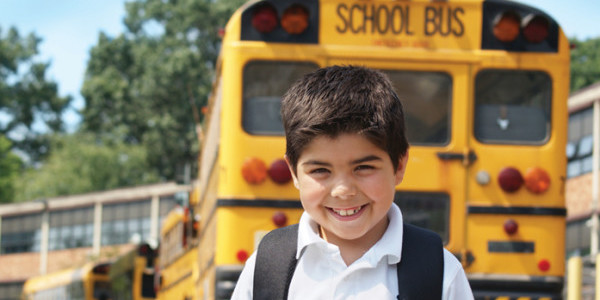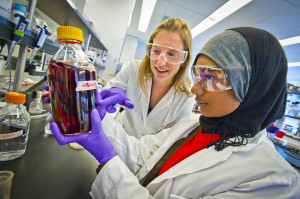
By Elizabeth McGuire
This month’s Engage Breakfast brought education equality to the spotlight. Our panelists discussed the disparities of our city’s K-12 public school system, specifically covering topics of local funding, regional planning, public policy and community involvement. Panelists included Kathie Tovo, District 9 Council Member and Mayor Pro Tem, City of Austin; Dr. Kazique Prince, Founder and CEO, Jelani Consulting; and Edmund Oropez, Interim Chief Schools Officer, Austin ISD. KXAN Assistant News Director Tim Vetscher moderated the discussion.
Some highlights from the morning…
In what ways is our region seeing division and inequality in education?
Kazique Prince quoted a recent report that ranked Austin as the most inequitable urban city in the country. While many people were surprised by this report, he said, many others have known this already and are grateful it is finally being brought to light. He explained that there are inequalities in many different areas, including housing, cost of living, mobility, job opportunities. All of these impact kids and complicate the issue of education equity.
 Edmund Oropez explained that while we have some of the most successful schools in the state of Texas we also have schools with a high concentration of poverty. For the last five years AISD has invested heavily “to right the wrongs of the past.” For example, we’ll spend $5,000 per pupil at Bowie, but contrast that to Reagan, Travis or LBJ…and we spend $8,000 per pupil. AISD recently started two early college high schools in Austin (at Reagan and LBJ high schools), to make sure there are first generation college-going children. We’re putting our investments back in, but it’s a big ship to move,” he said. “It’s a slow process. We believe that education is the equalizer and it can right those ships of inequalities and inequities.”
Edmund Oropez explained that while we have some of the most successful schools in the state of Texas we also have schools with a high concentration of poverty. For the last five years AISD has invested heavily “to right the wrongs of the past.” For example, we’ll spend $5,000 per pupil at Bowie, but contrast that to Reagan, Travis or LBJ…and we spend $8,000 per pupil. AISD recently started two early college high schools in Austin (at Reagan and LBJ high schools), to make sure there are first generation college-going children. We’re putting our investments back in, but it’s a big ship to move,” he said. “It’s a slow process. We believe that education is the equalizer and it can right those ships of inequalities and inequities.”
Kathie Tovo offered some data to put things in perspective. “If you look at a school like Casis Elementary (District 10) 2.5% of students are economically disadvantaged vs. Walnut Creek Elementary (District 4) where 93.5% are economically disadvantaged. This gives you a real sense of what we’re looking at in Austin and why it’s so critical that our council and city leadership really look at how we’re planning our city and how we’re targeting our housing resources and doing everything we can…to make sure that we are working against creating these pockets of poverty in our city.”
 Thoughts on the proposed legislation by Lt. Gov. Dan Patrick that’s related to education? One would give a letter grade (A to F) to schools.
Thoughts on the proposed legislation by Lt. Gov. Dan Patrick that’s related to education? One would give a letter grade (A to F) to schools.
All of the panelists disagreed with the proposed plan. Prince said, “We do enough testing of our systems as it is.” How would this new test be measured? he asked. (By grades of students, or the performance of teachers, or the involvement of community and parents?) “And all of those variables are not necessarily indicative of how well the school is doing” Prince emphasized that he wanted to honor the fact that families should be informed, but that such a rudimentary measure of schools is not going to solve problems in education.
Oropez added that even a new rating system, which would probably be clearer than the current one, would not be an accurate measure of how Austin schools are performing and how kids are doing. “We are opposed to putting everything on one particular test and rating our entire school on that.
What are some ideas to change the current school finance system?
Oropez said AISD currently sends $170 million of taxes back to the general fund and the state then redistributes the money. Next year AISD will give over $200 million of local property taxes that goes to the state. “To add some perspective: You could give every teacher in our district (all 6,000) a $30,000 raise if we had that money. That would be an amazing recruitment to bring in the very best. Money does matter.”
“We can’t use education as an equalizer,” Oropez said, “unless we have those kinds of resources. We’re struggling. We are 60% economically disadvantaged as a district. Are we able to serve our children and level set without that money? The answer is absolutely no.”
AISD is currently involved in a lawsuit to change the current finance system.
Prince said that when people hear about lawsuits, they think AISD wants to get rid of the plan entirely. “It’s about changing the equation,” he said. “We need to be giving to schools that don’t make as much money, but we need to change the equation so it’s fair to school districts like our own.”
From a city perspective, Tovo said the goal is to partner with AISD to address immediate financial needs. For example, last year the City of Austin allocated about $400,000 to after-school programs. “We need to look at those kinds of creative partnerships to meet the needs that are in jeopardy of not being met.” She also recommends watching this video put together by AISD, which captures school financing in a brief and understandable way.
 What portion of qualified children are in Pre-K and how can we get more kids enrolled?
What portion of qualified children are in Pre-K and how can we get more kids enrolled?
Pre-K is one of the new governor’s emergency items. “We know that Pre-K programs pay dividends down the road, said Oropez. “AISD currently funds a full-day Pre-K program and it costs $7 million a year and we do that because we believe in that so much.”
The affordability issues are real, though. AISD is seeing the number of Pre-K kids declining dramatically. There was a decline of enrollment of 1,000 students this past year. Oropez said he welcomes the governor’s stance on the Pre-K program. He hopes Abbott funds it and not just mandates it. AISD will continue to fund a full-day Pre-K program.
Prince noted that the Pre-K program is a shared commitment regardless of political persuasion to have families enroll their young kids in Pre-K because there’s value in that.
Tovo supports using some municipal resources to promote the Pre-K program. “I would love to see enrollment info in our utility bills and other kinds of city publications because it’s critical that people who qualify get enrolled.” And for people who don’t qualify based on income, she is a proponent of tuition-based Pre-K classes at neighborhood schools.
Why should education equality be important to all of us, not just those who have school-age children?
If a student is suspended multiple times in the early school years, the chance of him/her being in the prison system increase exponentially, said Prince. “It ends up being a situation where it’s taking away instead adding to the community.” Quality education can help prevent this trajectory.
“We live in a great city,” said Oropez, “but if we are going to sustain this kind of greatness it’s reliant on a quality, educated workforce that’s responsive to the needs of the city.”
Tovo added that companies need to feel confident in the schools before relocating employees here. Quality education also helps maintain property values. “Not everybody accepts that it’s a moral issue to support our schools,” she said, “but it’s certainly an economic development issue.”
Other than legislation, what are some strategies to improve education and close the divide?
Oropez emphasized partnerships with local businesses. “We have a lot of companies with resources, and we’re not looking for money. We are looking for business to open their doors for internships, staff development…to be thought-partners.” He shared a recent example of tech company Q2 company that hosted LBJ students for a day.
Prince said that even though it might be difficult, Austin should acknowledge that it still has “a legacy of racism, sexism and bias that’s holding back the community from achieving the heights we want to achieve.” He called on the district to help teachers be prepared to work with students of different cultural backgrounds.
Calls to Action
Kathie Tovo: We all have a stake in the success in our public schools whether or not you have children, so please get involved. Look at your existing network and the organizations you are involved with already and see if there’s an opportunity for them to participate…as partners, mentors, or on campus advisory boards. Make yourself available.
Kazique Prince: If you approach schools as the center of the community, they will be the first or second place you think about where you will contribute your time, your intellect and your resources. Don’t come in as a savior; come in as a partner and figure out how you can be part of the solution.
Edmund Oropez: We know we’ve had a bureaucratic model in the past, but this administration is about changing kids’ lives in a positive way. We have some of the best schools around and we welcome your input and your involvement. We need thought-partners, we need talented people to assist our principals, teachers, families, to make a difference in people’s lives. That’s what this AISD is about. It’s about all of us working together as the great city we are to build the best schools around.
You can listen to today’s session here:
